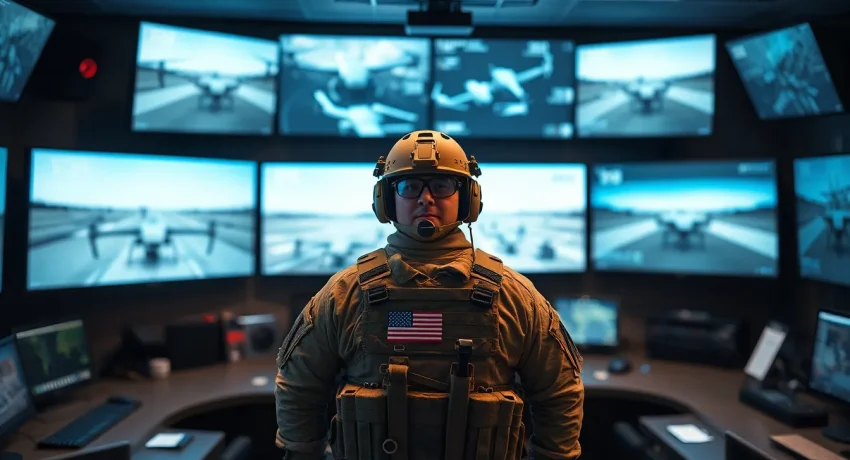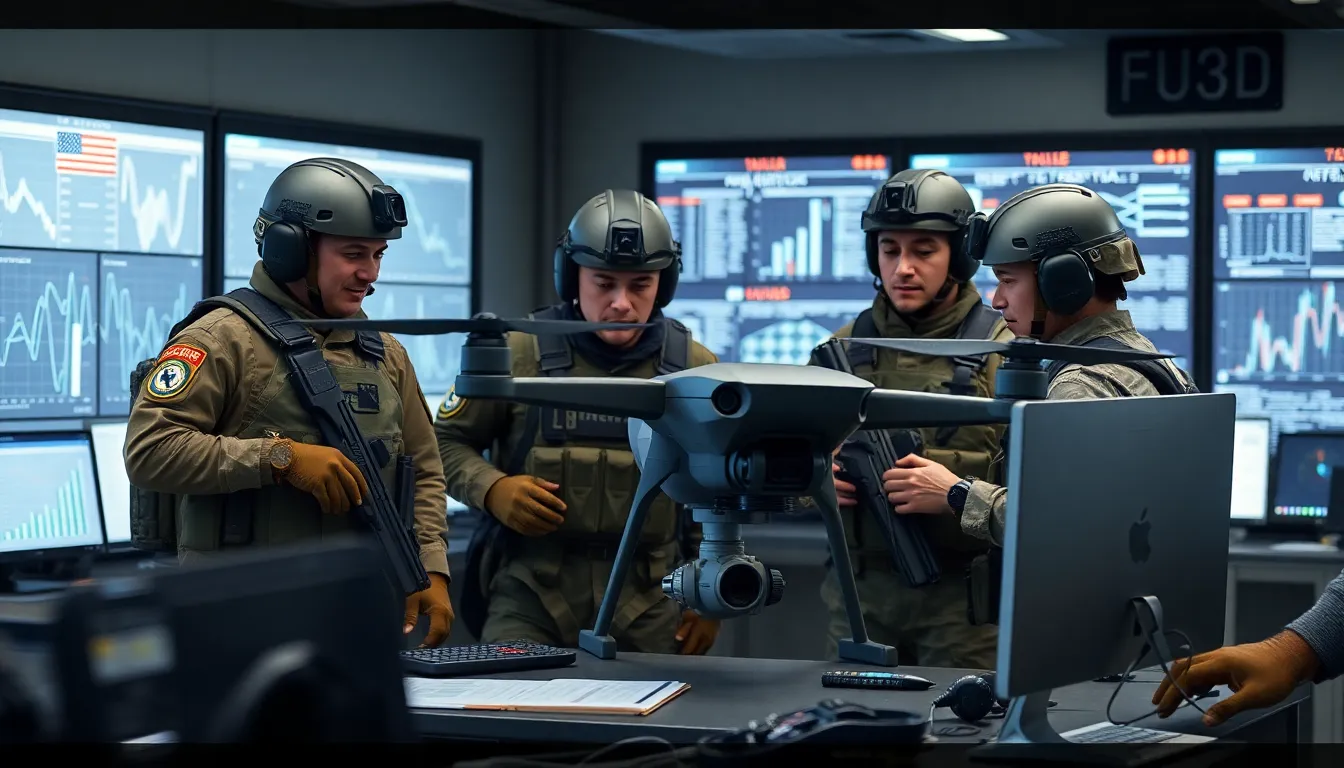Table of Contents
ToggleIn a world where technology evolves faster than a soldier can say “deploy,” military tech news is the battlefield of innovation. From drones that can outsmart a seasoned general to armor that could survive a meteor shower, the latest advancements are nothing short of jaw-dropping. It’s like watching a sci-fi movie, but with real-life stakes and a lot less popcorn.
Recent Advances in Military Technology
Recent developments in military technology showcase innovations that directly impact global security and warfare strategies. Key advancements include the integration of artificial intelligence and the rise of autonomous weapons systems.
Artificial Intelligence in Defense
Artificial intelligence transforms defense capabilities significantly. It streamlines data analysis, enhancing situational awareness for military personnel. AI algorithms process vast amounts of information quickly, leading to improved decision-making and predicting enemy actions. Recent examples include AI-driven surveillance systems that detect potential threats, boosting battlefield effectiveness. Additionally, AI enhances logistics by optimizing supply chain management, ensuring timely resource allocation. Many military organizations recognize the potential of AI, investing heavily to develop cutting-edge solutions designed for modern combat environments.
Autonomous Weapons Systems
Autonomous weapons systems are at the forefront of military innovation. These systems execute missions with minimal human intervention, increasing precision and reducing risk to personnel. Drones and robotic ground vehicles exemplify this shift, demonstrating the utility of remote operations in conflict zones. Recent trials show that these systems can engage targets swiftly and accurately, adapting to dynamic threats. Military experts emphasize the importance of ethical considerations surrounding their use, as fully autonomous systems raise questions about accountability. As nations develop these technologies, discussions around regulation and control become critical to ensure they enhance security without compromising safety.
Key Players in the Military Tech Industry
The military tech industry features a diverse landscape of significant contributors, from established giants to innovative newcomers.
Major Defense Contractors
Lockheed Martin, Boeing, and Northrop Grumman dominate the defense contracting sector. These companies supply advanced technologies such as fighter jets, missile systems, and cybersecurity solutions. Raytheon, known for its precision weapons and missile defense systems, also plays a vital role. Each of these contractors invests heavily in research and development, pushing the boundaries of technology to enhance national security. Their collaborations with military organizations lead to the rapid deployment of new capabilities, keeping armed forces agile in the face of evolving threats.
Emerging Startups
Innovative startups are reshaping military technology. Palantir Technologies, specializing in data analytics, supports military operations with enhanced data interpretation. Anduril Industries focuses on autonomous systems, creating drones and border security solutions that improve situational awareness. Additionally, companies like Shield AI leverage artificial intelligence to automate data processing and combat decision-making. Each startup contributes unique technologies that address specific defense challenges, fostering a dynamic ecosystem that encourages rapid advancements in military capabilities.
Impact of Military Technology on Warfare
Military technology reshapes modern warfare. Innovations like drones and autonomous systems enhance military effectiveness while complicating traditional combat strategies.
Transformation of Combat Strategies
Adopting advanced technology revolutionizes combat tactics. Forces now utilize real-time data analysis for strategic planning. AI systems provide predictive insights, enabling quick adjustments during operations. Precision strikes reduce collateral damage and improve mission success. As armed forces integrate unmanned systems, they expand operational reach without risking personnel. Situational awareness benefits from enhanced surveillance capabilities, leading to informed decision-making on the battlefield. Ultimately, these shifts demand continuous adaptation among military leaders and planners.
Ethical Considerations
Emerging military technologies raise pressing ethical questions. Autonomous weapons systems challenge existing rules of engagement, blurring the lines of accountability. Decisions made by machines without human oversight invoke concerns over responsibility for actions taken. As technologies advance, discussions around human oversight and ethical warfare intensify. Regulations must evolve to address issues like bias in AI algorithms, potentially impacting targeting decisions. Governments and military organizations must navigate these moral dilemmas to ensure compliance with international norms while maintaining operational effectiveness.
Future Trends in Military Technology
The landscape of military technology continues to evolve rapidly, underscoring the importance of innovative solutions in enhancing national security and defense strategies.
Cybersecurity Innovations
Cybersecurity innovations play a critical role in safeguarding military infrastructure. Organizations pursue advanced threat detection systems to counteract cyber attacks targeting sensitive data and communications. These technologies utilize machine learning algorithms that enhance anomaly detection and response times, making defense systems more resilient against growing digital threats. Collaborative efforts among defense contractors, including Lockheed Martin and innovative startups like Darktrace, are crucial for developing proactive cybersecurity measures that protect military assets in cyberspace.
Space-Based Military Applications
Space-based military applications are becoming increasingly vital for strategic advantages in defense. Utilization of satellites for real-time intelligence gathering enhances situational awareness during operations. These systems facilitate high-resolution imaging and secure communications, enabling military forces to maintain operational superiority. Companies like SpaceX are advancing satellite technologies, offering cost-effective solutions for deploying large satellite constellations. The integration of space capabilities into military strategies not only improves response times but also strengthens global defense partnerships by fostering collaboration among allied nations.
Conclusion
The landscape of military technology is transforming at an unprecedented pace. Innovations in drones and autonomous systems are not just enhancing operational capabilities but also reshaping the ethical framework surrounding modern warfare. As defense contractors and startups collaborate, the push for advanced cybersecurity and space-based applications becomes increasingly vital.
Navigating the complexities of these advancements requires a keen focus on accountability and regulatory measures. The future of military technology promises both exciting possibilities and significant challenges, making it essential for stakeholders to engage in ongoing discussions about safety and ethical considerations. The evolution of military tech will continue to influence global security dynamics, demanding vigilance and innovation at every turn.





